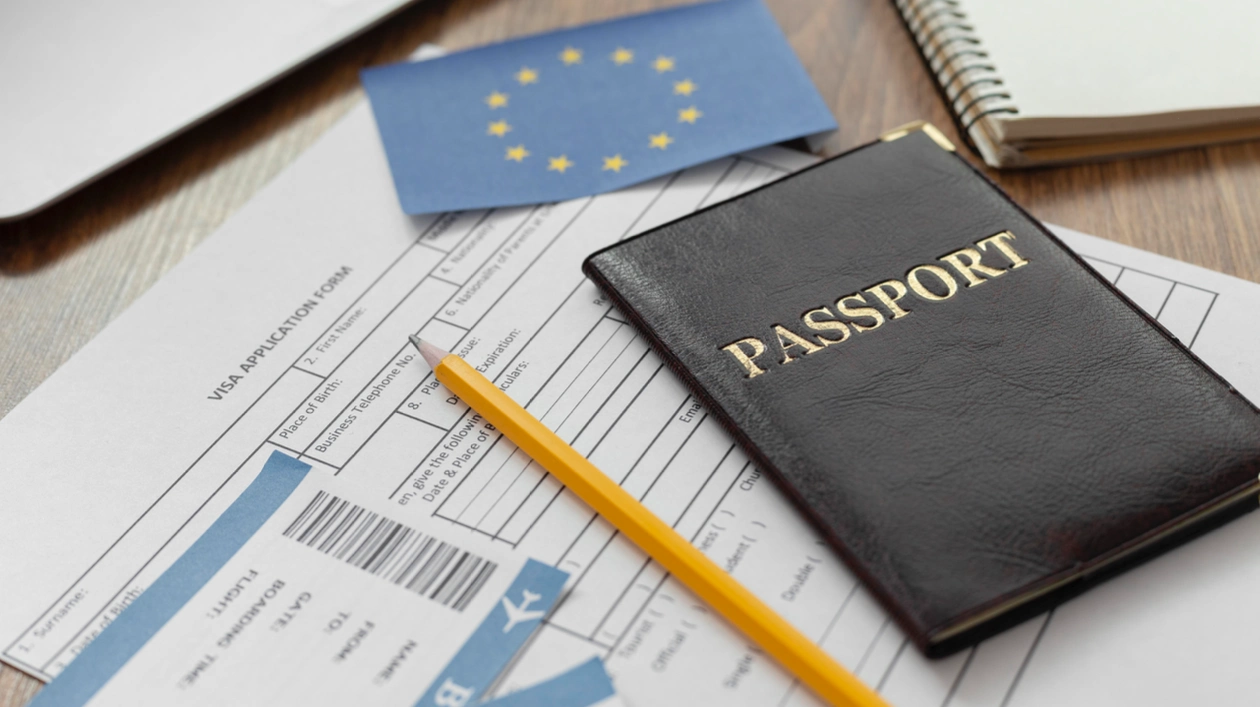How to apply for a schengen visa from UAE
Dreaming of strolling through the romantic streets of Paris, marveling at the Colosseum in Rome, or experiencing the vibrant culture of Barcelona? A Schengen visa can turn your European travel dreams into reality. This single document grants you access to 26 European countries, allowing you to explore diverse landscapes, rich history, and captivating cultures without the hassle of multiple visa applications.

Whether you're a UAE resident planning a family vacation, a business trip, or a solo adventure, this comprehensive guide will walk you through everything you need to know about applying for a Schengen visa from Dubai.
What is a Schengen Visa?
It is a short stay visa that allows its holder to travel freely within the Schengen Area for a maximum of 90 days within a 180-day period. This means you can visit any of the 26 Schengen countries without needing individual visas for each.
Who needs a Schengen Visa?
While UAE citizens enjoy visa-free travel to Schengen countries, residents of other nationalities living in the UAE may need to apply for a the visa.
Types of Schengen Visas:
· Tourist Visa: This is the most common type, ideal for leisure travel and sightseeing.
· Business Visa: This visa is required if you're traveling for business purposes, such as attending meetings or conferences.
· Airport Transit Visa: This visa is necessary if you have a layover in a Schengen country en route to another destination.
Schengen Visa Requirements for UAE Residents:
To apply for a the visa from Dubai, you'll need to provide the following required documents:
· Valid passport: Your passport must be valid for at least three months beyond your intended stay in the Schengen Area and have at least two blank pages.
· UAE residence visa: Your residence visa must be valid for at least four months.
· Completed application form: You can obtain the application form online or from the relevant embassy/consulate.
· Two recent photographs: Photos must be taken against a white background and meet specific size requirements.
· Bank statement: You need to provide a bank statement for the past three months, demonstrating sufficient funds to cover your travel expenses.
· No-objection certificate from your employer: This letter confirms your employment status and purpose of travel.
· Proof of travel insurance: Travel insurance is mandatory and must cover medical expenses and repatriation for the entire duration of your trip.
· Flight and hotel bookings: You need to provide confirmed flight and hotel reservations for your entire itinerary. Additional documents may be required depending on your specific situation and the purpose of your visit.

Application Process:
1. Identify the relevant embassy/consulate: You need to apply to the embassy/consulate of the country that is your main destination or the country where you will spend the most time.
2. Gather the required documents: Ensure you have all the necessary documents listed above.
3. Schedule an appointment: Most embassies/consulates require you to book an appointment for submitting your visa application and biometrics.
4. Attend the appointment: Submit your application form, supporting documents, and pay the visa fee.
5. Await processing: The visa processing time can vary, but typically takes around 15 working days.
Tips for a Successful Schengen Visa Application:
· Plan ahead: Start the application process well in advance, ideally at least six months before your intended travel date.
· Provide complete and accurate information: Ensure your visa application form is filled out correctly and all supporting documents are included.
· Demonstrate strong ties to the UAE: Provide evidence of your employment, property ownership, or family ties to show you have strong reasons to return to the UAE after your trip.
· Consider professional assistance: If you're unsure about any aspect of the visa application process, consider seeking help from a visa consultant or travel agency.
Schengen Visa Fees:
The visa fee for adults is €80 for a single-entry visa. Children between the ages of 6 and 12 pay a reduced fee of €40, while children under 6 are exempt from the visa fee. Additional fees may apply for services such as courier delivery or document translation.
Common Reasons for Schengen Visa Rejections: While many visa applications are successful, some are rejected. Common reasons for rejection include:
· Incomplete or inaccurate application forms: Ensure your application is complete and all information is accurate.
· Lack of supporting documents: Provide all required documents as per the checklist.
· Insufficient financial means: Demonstrate you have enough funds to cover your travel expenses.
· Previous visa violations: If you have previously overstayed or violated visa regulations, your application may be rejected.
By understanding the requirements and common pitfalls, you can increase your chances of a successful visa application.
Additional Information:
· Travel insurance: Make sure your travel insurance meets the minimum coverage requirements set by the Schengen Area.
· Flight and hotel bookings: While you need to provide confirmed bookings for your visa application, you may be able to cancel and rebook later if your travel plans change.
· Visa processing time: While the standard processing time is 15 working days, it can take longer in some cases. Apply well in advance to avoid any last-minute complications.
· Visa validity: Your visa will be valid for a specific period, and you must adhere to the permitted duration of stay.
With careful planning and preparation, obtaining a Schengen visa from Dubai can be a smooth and straightforward process. This visa opens the door to a multitude of travel opportunities, allowing you to experience the diverse cultures and captivating landscapes of Europe.
Remember, this guide provides general information. Always check the specific requirements and procedures with the relevant embassy/consulate before submitting your application.
Enjoy your European adventure!
Frequently Asked Questions:
Q: When applying for a Schengen visa from Dubai, do I need to provide a bank statement?
A: Yes, a bank statement for the past three months is one of the required documents when applying for the visa from Dubai.
Q: Can I apply for a Schengen visa from Dubai if I'm a United Arab Emirates citizen?
A: UAE citizens enjoy visa-free travel to Schengen countries, so they typically don't need to apply for the visa.
Q: How long does it take to process an application for a Schengen visa from Dubai?
A: The visa processing time can vary, but typically takes around 15 working days. However, it's recommended to apply well in advance to avoid any last-minute complications.
Q: Can I apply for a Schengen visa if I'm visiting multiple Schengen countries?
A: Yes, the visa allows you to travel freely within the Schengen Area, which consists of 26 Schengen countries.
Q: Is travel insurance required when applying for a Schengen visa?
A: Yes, proof of travel insurance that covers medical expenses and repatriation for the entire duration of your trip is a mandatory requirement when applying for the visa.
Avoid These Common Mistakes When Applying for a Schengen Visa. By following these guidelines, you can significantly increase your chances of having your Schengen visa approved.
Relying on a Friend's Random List of Required Documents
One common mistake, especially among first-time Schengen visa applicants, is following advice from friends or family who have previously obtained a Schengen visa, applying their advice verbatim throughout the process.
The required documents for a Schengen visa can vary significantly depending on the country and embassy. Additionally, visa requirements are regularly updated by Schengen Area embassies worldwide.
Those who rely on a random list from a friend or family member may overlook important, newly added requirements or documents that are necessary according to new criteria.
It’s crucial for Schengen visa applicants to gather documents based on the official list provided by the embassy where they will submit their application.
Passport Does Not Meet the Necessary Criteria
Having a passport that’s valid for a few more months is often insufficient, as some travelers have discovered the hard way.
The EU enforces specific and stringent passport requirements for Schengen visa applicants, which include:
The passport must be valid for at least six months beyond the planned date of departure from the Schengen Area.
It must have been issued within the last ten years by the date the applicant intends to leave the Schengen country they are visiting.
The passport must contain at least two blank pages, and these pages cannot be added later.
Failure to comply with any of these requirements typically results in visa denial.
Furthermore, travelers seeking a multiple-entry visa for three or five years should note that if their passport’s validity is shorter than the requested visa duration, they will likely receive a visa that expires sooner, typically just before their passport does.
Filling the Application Form With Info That Doesn’t Align With Other Documents
Every traveller needs to fill in the application form for a Schengen visa (Download the application on the SchengenVisaInfo page). This is the first document that is required. Many travellers make the mistake of putting into the application form different information than those in the other documents.
For example, if their passport is valid for six more months, some put in the application that the passport is valid for longer than that. In other occasions, they write the required period of visa validity in different dates, than the dates for which they have travel insurance, or accommodation.
Such mistakes, in particular when done intentionally, may result automatically in the rejection of the visa application.
Submitting the Application Too Early or Too Late
The timing of your Schengen visa application is crucial. The Schengen Visa Code stipulates that the earliest you can apply is six months before your intended trip, and the latest is 15 working days before your departure.
Applying too far in advance, such as a year before your trip, can lead to issues, even at very busy embassies. Conversely, submitting your application too late, especially if you've previously received a visa quickly, can result in delays or even rejection.
To avoid these problems, ensure you submit your application within the recommended timeframe, but no earlier than six months before your planned departure.
Inadequate or Incorrect Travel Insurance
Skipping travel insurance under the assumption that "nothing will happen to me" is a significant mistake. The embassy requires Schengen travel insurance with a minimum coverage of €30,000, including repatriation in case of death, regardless of your health history or accident record.
Common errors include purchasing insurance for a period shorter than your intended stay in the EU or opting for coverage that falls below the required amount.
If your insurance policy does not cover repatriation in case of death, even if it offers sufficient coverage for other incidents, it will not meet the visa requirements.
Applying at the Wrong Embassy/Consulate/Visa Center
Another frequent mistake, especially for travelers planning to visit multiple Schengen countries, is applying at the wrong embassy.
If you intend to visit several Schengen Area countries on a single visa, you should apply as follows:
If you plan to spend an equal amount of time in each country, apply at the embassy of the country you will visit first. For example, if you intend to spend five days in Austria, five in Germany, and five in France, but you enter the Schengen Zone through Austria, you should submit your application to the Austrian embassy.
If you plan to spend different amounts of time in each country, apply at the embassy of the country where you will stay the longest. For instance, if you plan to stay three days in Austria, five days in Germany, and seven days in France, submit your application to the French embassy.
You can use the Visa Wizard by SchengenVisaInfo to determine the correct embassy or consulate for your application.
Not Bringing Cash to Pay the Application Fee
While this mistake won’t result in visa rejection, it can cause unnecessary hassle. Many applicants assume they can pay the visa fee with a card or online, but embassies typically require the exact amount in cash.
To avoid complications, bring the exact amount in cash, and try to avoid large banknotes, especially if you are one of the first applicants of the day. This will help you avoid any unnecessary headaches on the day of your interview.






